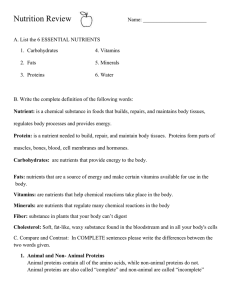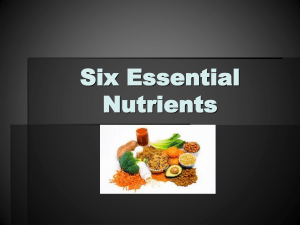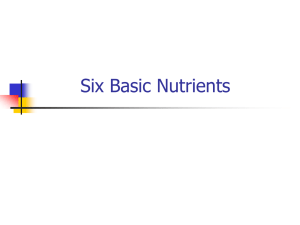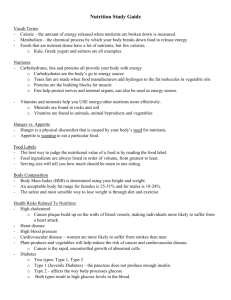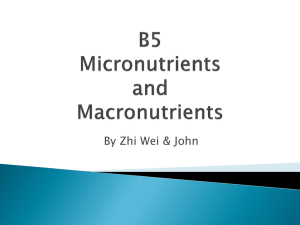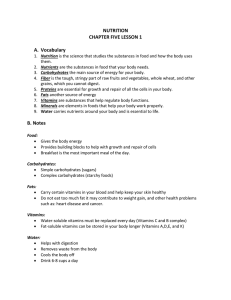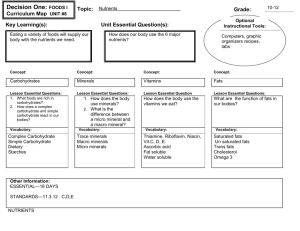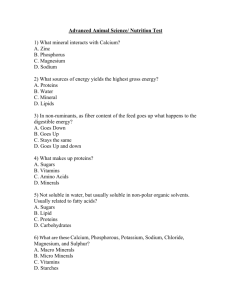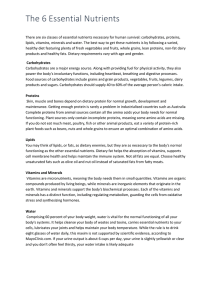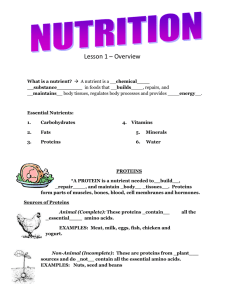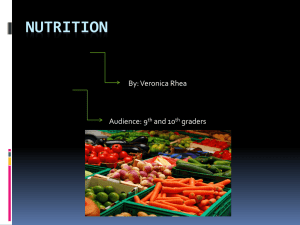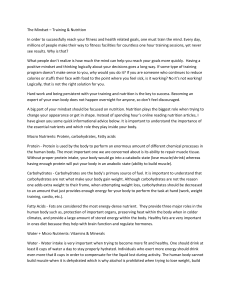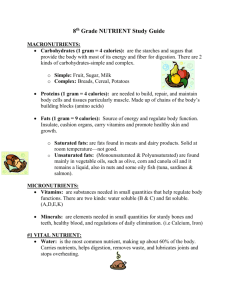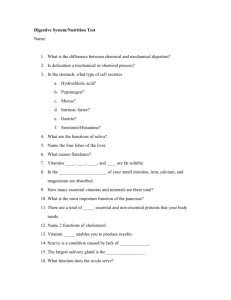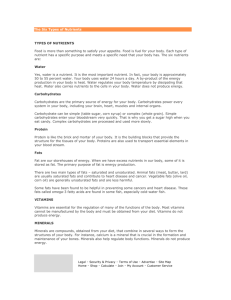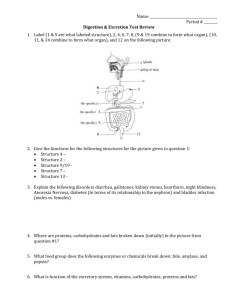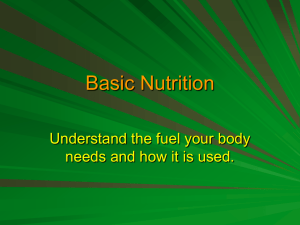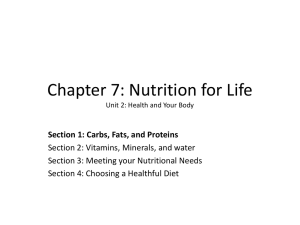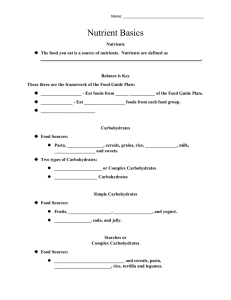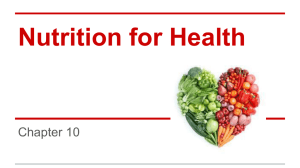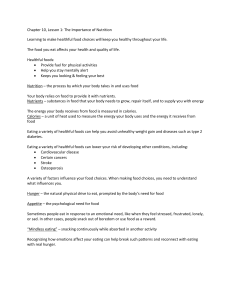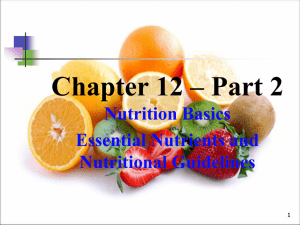Nutrition Notes
advertisement
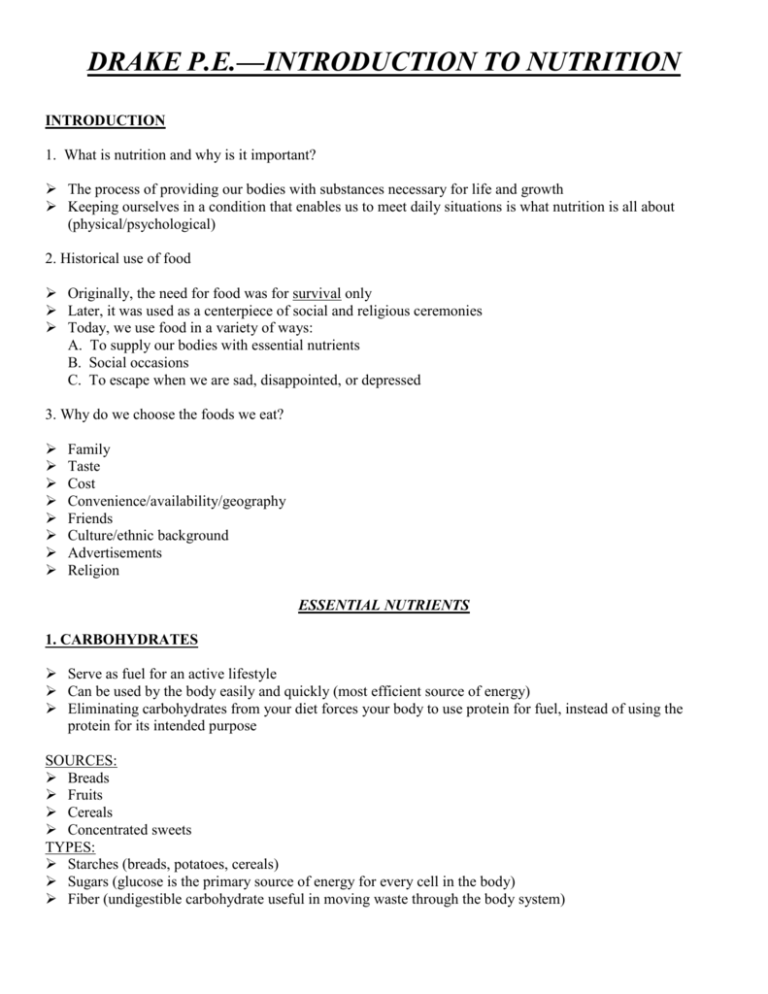
DRAKE P.E.—INTRODUCTION TO NUTRITION INTRODUCTION 1. What is nutrition and why is it important? The process of providing our bodies with substances necessary for life and growth Keeping ourselves in a condition that enables us to meet daily situations is what nutrition is all about (physical/psychological) 2. Historical use of food Originally, the need for food was for survival only Later, it was used as a centerpiece of social and religious ceremonies Today, we use food in a variety of ways: A. To supply our bodies with essential nutrients B. Social occasions C. To escape when we are sad, disappointed, or depressed 3. Why do we choose the foods we eat? Family Taste Cost Convenience/availability/geography Friends Culture/ethnic background Advertisements Religion ESSENTIAL NUTRIENTS 1. CARBOHYDRATES Serve as fuel for an active lifestyle Can be used by the body easily and quickly (most efficient source of energy) Eliminating carbohydrates from your diet forces your body to use protein for fuel, instead of using the protein for its intended purpose SOURCES: Breads Fruits Cereals Concentrated sweets TYPES: Starches (breads, potatoes, cereals) Sugars (glucose is the primary source of energy for every cell in the body) Fiber (undigestible carbohydrate useful in moving waste through the body system) 2. PROTEINS Play an important role in the growth and repair of the body's tissues/cells Are known as the "building blocks" of the body TYPES: Incomplete (non-meat proteins) Complete (animal proteins) SOURCES: Grains Vegetables Fruits Nuts Beans Rice Animal flesh Dairy products 3. FATS (store twice as much energy as proteins or carbohydrates but are not as easy to convert to energy as carbohydrates TYPES: 1. Animal Fats Saturated High in cholesterol Solid at room temperature SOURCES: Meat Cheese Milk Poultry Egg yolk Ice Cream 2. Vegetable Fats Unsaturated Lower blood cholesterol (LDL) Liquid at room temperature SOURCES: Margarine Salad Dressing Mayonnaise Cooking oils 4. MINERALS (important in regulating various bodily functions) Development of bones, teeth, muscles (CALCIUM) Formation of hemoglobin (IRON) Proper functioning of the thyroid gland (IODINE) Maintaining ones heartbeat, water balance, nerve transmission, and metabolism (POTASSIUM) Maintain a proper balance of body fluid (SODIUM) Minerals have no calories and provide no energy Excessive intake can be harmful (excessive amounts of sodium may lead to abnormal fluid retention, which is related to hypertension) SOURCES: Milk Green leafy vegetables Whole grains Meats Fruits Seafood Iodized salts 5. VITAMINS Organic chemical substances found in foods Do not supply energy, but aid in metabolism (utilization and absorption of nutrients) Cannot replace food! All vitamins can be dissolved (water-soluble/fat-soluble) FAT SOLUBLE VITAMINS: Stored in fat deposits of body (liver) An over supply of these vitamins can cause toxicity (see handout) Most important fat soluble vitamins: A, D, E, K WATER SOLUBLE VITAMINS: Must be consumed on a regular basis Dissolve in water, cannot be stored in body tissue Overcooking destroys vitamin content in food Most important water soluble vitamins: B, C 6. WATER * DO NOT wait until you're thirsty to drink water! Essential for normal functioning of the body Primary component of blood and tissue fluids Makes up about 65% of one's body weight PHYSIOLOGICAL FUNCTIONS: Carries dissolved waste products from the body Helps digest food Carries nutrients throughout body Critical in temperature control (heat illness can result from failure to drink enough water before, during, and after strenuous exercise) 1 cup every 20 minutes while exercising at least 2 quarts a day
